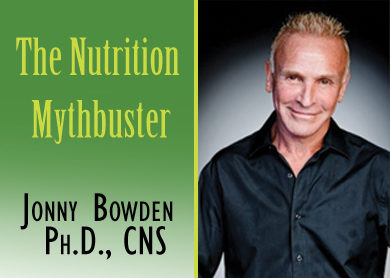Here’s a quick question for you: Can you name three supplements that almost everyone on the planet could benefit from taking?
Most of you would probably list fish oil as one of the top three, and you’d be right.
Many of you might also suggest vitamin D (also right). But many of you would probably not think of magnesium.
And that would be a mistake.
Consider this: Magnesium deficiency can affect virtually every single organ system in the body. It’s involved in more than 300 enzyme reactions in the body including fat, protein and glucose metabolism; muscle and membrane transport; and energy production.
In the classic article called, "The Importance of Magnesium to Human Nutrition," Michael Schachter, M.D., devotes a full four paragraphs to the possible symptoms and problems associated with getting too little magnesium—they range from salt and carbohydrate cravings to panic attacks, PMS, mitral valve prolapse, palpitations, cramps, muscle tensions and insomnia.
Magnesium is the fourth most abundant mineral in the body and is absolutely essential to good health. There’s almost nothing I can think of that it isn’t good for. (Okay, maybe it’s useless for getting a date on a Saturday night or increasing the return on your 401k.) About half of your body’s total magnesium is found in bones, and the rest is found mainly inside cells of body tissues and organs, with the highest magnesium concentrations found in those that are also the most metabolically active: the brain, liver, kidney and heart. Only 1% of it is in the blood, so a blood test for magnesium deficiency is pretty useless.
Stress and Cardiovascular Health
Too much stress causes magnesium to be depleted, which can lead to hypertension, coronary artery constriction, arrhythmias and heart attack. Here’s how it works: When you’re under too much stress, your body overproduces substances called catecholamines. While some act as neurotransmitters and make us feel good (dopamine), catecholamines also act as hormones in the blood, and too high a level of them will cause magnesium to be released from cells into the blood and then excreted in urine. A low magnesium level in the cells causes heart tissue destruction.
There’s a circular relationship between stress and magnesium. Stress causes low magnesium levels, low magnesium levels cause stress and the circle continues in a nasty downward spiral. Both stress and magnesium deficiency set you up for cardiovascular disease. In animal studies, giving animals magnesium has been shown to prevent this process from happening, protecting heart tissue from destruction.
Studies also show that a high magnesium intake is associated with lower blood pressure. Simply put, blood pressure is lower when magnesium levels are optimal. One of magnesium’s many functions is to help maintain the critical balance between sodium and potassium in a cell. (High sodium intake coupled with low potassium intake is an absolute disaster from the point of view of your heart.) Classic research on the Paleolithic diet by Boyd Eaton shows that our hunter-gatherer ancestors got about 10 times more potassium than sodium in their diet, but that the ratio has been completely reversed in our modern lives, setting us up for all sorts of heart problems.
Diabetes and Blood Sugar Control
Magnesium plays a critical role in the secretion and action of insulin, thereby helping to control blood sugar. Magnesium supplements are absolutely essential for anyone with type-2 diabetes or anyone at risk for it.
The Nurses’ Health Study and the Health Professionals Follow-Up Study are two of the most respected, long-range studies of health ever done. More than 170,000 health professionals were followed in these studies for between 12 years (men) and 18 years (women). Over time, the risk for developing type-2 diabetes was significantly greater in both men and women with a lower intake of magnesium.
And a number of studies have looked at the potential benefits of magnesium supplements for helping to control type-2 diabetes. In one study, 63 subjects with below normal blood levels of magnesium received either 300 mg of elemental magnesium a day or a placebo. At the end of only 16 weeks, those who received the magnesium had improved metabolic control of diabetes (i.e., lower levels of hemoglobin A1c, an important marker for diabetes).
Energizer and Achy Muscle Reducer
Because magnesium is required in both the red blood cells and the muscles for energy production, low levels can easily sap your energy. If you’ve got any type of muscle aches or fatigue associated with conditions like tension headache, fibromyalgia or chronic fatigue, consider the possibility that you’re low in magnesium.
Magnesium is just all around great for cramps. Taking extra magnesium (and sometimes potassium) is one of the best ways I know of to ease leg cramps from exercise. It’s also great for menstrual cramps, leg cramps from pregnancy and virtually every other cramp you can think of.
Bone Health
Magnesium supplements are more important than calcium in reversing bone loss in postmenopausal women, one of the most vulnerable populations for osteoporosis, according to a May 1990 report in the Journal of Reproductive Medicine. The findings were so profound that the authors argued that the later development of osteoporosis may be due to a chronic magnesium deficiency. A second study done in 1998 suggested that magnesium consumed in levels higher than the recommended daily allowance is critical for preserving and slowing bone loss. And if you needed any further proof, the Framingham Heart Study found that men and women with the highest intakes of potassium and magnesium had the strongest bone density.
How To Take It
Magnesium is found in dark green leafy vegetables, nuts (almonds, cashews) and certain fish (halibut), but a wide variety of fruits, vegetables, nuts and seeds are all good sources.
I’m also a big fan of Natural Vitality’s NATURAL CALM, which provides magnesium in a tasty beverage that mixes easily with water and tastes great. We use it at my house anytime stress levels are running high (which is most of the time!) Natural Vitality also makes Natural Calm bath which is basically a much more pleasant version of Epson salts. With a relaxing Natural Calm bath you’ll absorb a ton of muscle-relaxing magnesium through your skin, you’ll also lower your stress hormones. Try it! WF
 Jonny Bowden, “the Nutrition Myth Buster”™ is a board-certified nutritionist and the best-selling author of The Great Cholesterol Myth and 13 other books. Visit him at www.jonnybowden.com.
Jonny Bowden, “the Nutrition Myth Buster”™ is a board-certified nutritionist and the best-selling author of The Great Cholesterol Myth and 13 other books. Visit him at www.jonnybowden.com.
Posted on WholeFoods Magazine Online, 9/9/15
NOTE: The statements presented in this column should not be considered medical advice or a way to diagnose or treat any disease or illness. Dietary supplements do not treat, cure or prevent any disease. Always seek the advice of a medical professional before altering your daily dietary regimen. The opinions presented here are those of the writer. WholeFoods Magazine does not endorse any specific company, brand or product.










